EWOSA News - January 2024

- Home
- EWOSA News - January 2024
Welcome to the latest edition of the Energy and Water Ombudsman SA (EWOSA) quarterly newsletter: your one stop shop for emerging consumer trends, hot issues and policy matters.
On this page
From the Ombudsman
Happy New Year and welcome to our first newsletter for 2024. I hope you all enjoyed the festive season with family and friends.
In South Australia, this time of the year of course means hot and dry summer weather, with both electricity and water in high demand.
In our Customer Corner, we provide advice and information on where to find suggestions on using energy and water efficiently and effectively.
Two simple strategies are to set the thermostat on your air conditioner to 25 degrees – which is cheaper than running it at 20 – and to water your garden in the cool of the morning or in the evening when the sun is low. This will reduce water evaporation and your own exposure to the heat.
If you have a solar system, also keep in mind that it will not be as productive on very hot days. And dirty panels reduce efficiency even further.
It has been a busy time for our office, and we expect that to continue in the year ahead, with cost-of-living pressures making paying energy and water bills harder.
It is important to check that you are receiving the best deal from your energy retailer and to ask to be put onto a payment plan if you are having difficulties paying your bills.
We received 1733 complaints in the December quarter of 2023 – 14% lower than for the September quarter, but 8% higher than for the December quarter in 2022.
For the 2023 calendar year, we received around 6680 complaints – a 16% increase on 2022. Billing accounted for around two thirds of complaints. Electricity made up 84% of complaints, followed by gas, with about 11%.
We are here to help if you are unable to resolve a matter with your provider or need some information. Please contact us on 1800 665 565 or via our website if you need assistance.
Sandy Canale
Energy and Water Ombudsman SA
Consumer Trends 1


Hot Topics
The Essential Services Commission of South Australia (ESCOSA) is conducting the regulatory determination for SA Water for 2024-28.
Its Draft Determination, released in January, proposes the maximum revenues SA Water can earn from its customers over the four-year period and the prudent and efficient capital and operating expenditure required to deliver the service standards it must provide for its customers.
Prices for water and sewerage services will be determined by SA Water and the State Government after the Final Determination has been released in June.
Submissions on the Draft Determination are due on March 6 and EWOSA intends to respond.
To read the Draft Determination and provide a submission, you can visit https://www.escosa.sa.gov.au/industry/water/retail-pricing/sa-water-regulatory-determination-2024.
The Australian Energy Regulator (AER) released an Issues Paper last November on a Review of the Exemptions Framework for Embedded Networks.
These are private electricity networks that serve multiple customers. They include caravan parks, retirement villages and unit or apartment blocks.
The AER is seeking feedback on the experiences of customers in residential embedded networks, particularly whether they are seeing benefits or are receiving poor service. Depending on the information received, the AER may consider whether any action is needed to strengthen the regulations on embedded networks and improve customer protections.
Submissions on the Issues Paper are due by February 5 and EWOSA intends to respond.
If you are a customer of an embedded network and wish to let the AER know that you are either experiencing problems or are happy with your service, you can provide a submission by visiting https://www.aer.gov.au/news/articles/communications/have-your-say-exemptions-framework-embedded-networks. Importantly, you can provide information confidentially if you wish.
Late last year the AER provided advice to Energy Ministers on the National Energy Customer Framework (NECF), which provides consumer protections such as requirements on billing information, connections and disconnections, hardship policies and external dispute resolution.
With the growth in Consumer Energy Resources, such as solar panels, storage batteries and electric vehicles, new business models around energy supply and services are emerging and some of the providers of these services are not subject to the NECF.
The AER has recommended changes to ensure the framework continues to adequately protect consumers in the evolving energy market. This is intended to improve consumer trust in the market and support the adoption of the technologies, that will enable the energy transition to a lower emissions future.
For more information on the AER’s advice to Energy Ministers, you can visit https://www.aer.gov.au/news/articles/communications/aer-releases-final-advice-consumer-protections-future-energy-services-energy-ministers-consideration.
Consumer Trends 2


Case Studies
The issue
Mr N had a solar system installed and requested an upgrade to a solar-compatible meter. When this was delayed, he sought compensation from his provider for the loss of solar benefits for the period of the delay.
He also queried the usage on the final bill for the removed meter and wanted this reviewed.
Our Review
The National Electricity Rules requires that a meter be replaced within 15 business days of a request being received from a customer.
We found that Mr N’s provider did not meet this timeframe and further inconvenienced him by missing several upgrade appointments. We also found that the delay caused him to miss out on solar benefits.
However, we confirmed the usage billed for the removed meter to the date of the meter upgrade was correct.
Resolution
The provider applied a $381 credit to Mr N’s account for missed solar benefits and an additional $300 goodwill credit for missed meter upgrade appointments.
The issue
Ms O complained about high bills. She believed she had been charged for more imported energy than she had actually used and that she had not received a solar rebate for the Virtual Power Plant (VPP) system she had installed.
She requested a review of her sign-up call and contract to confirm what was quoted, and a review of the meter data and pricing billed.
Our Review
We reviewed the sign-up call recording, a copy of the contract, including its terms and conditions, the bills and meter data.
We found that:
- the bills were correctly based on all use – whether it came from the solar, battery or the grid – consistent with the contract
- the bills were correctly based on the initial quoted pricing and the pricing varied according to the contract
- Ms O’s VPP contract did not include solar feed-in rebates because the solar and Powerwall home battery were installed at no cost.
Resolution
The accuracy of the bills was confirmed.
The provider applied a $100 credit to Ms O’s account as a gesture of goodwill. She was offered a payment plan for the remaining balance.
Consumer Trends 3
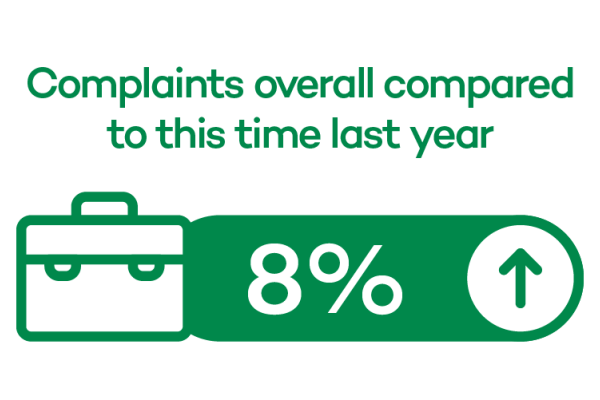
Customer Corner - Water and energy use and costs can increase dramatically over summer. But there are some things you can do to save on these costs and still keep cool.
The South Australian Government’s Summer Cooling Guide for 2023-24 provides information to help you reduce costs and the temperature in your home. These include:
- keeping the heat out with shade – this can be as simple as closing curtains and blinds or installing adjustable external blinds
- installing ceiling and wall insultation
- closing doors to cool only the areas you need to with air conditioning during the day and opening windows at night when the temperature is lower outside
- wearing loose and light clothing and keeping hydrated
- doing an energy audit at home – the Home Energy Toolkit can be borrowed for free from local libraries.
The guide also provides comparisons on cooling appliance options, how much they might cost to run and the size of rooms they operate best in. You can access it at https://www.energymining.sa.gov.au/__data/assets/pdf_file/0010/947170/Summer-cooling-guide.pdf.
In addition, EWOSA has a How to save energy at home factsheet you can access at https://ewosa.com.au/assets/volumes/general-downloads/fact-sheets/How-to-save-energy-at-home.pdf. It includes a few water-saving tips as well.
There are a number of ways you can reduce your water use at home and in the garden. For example:
- take shorter showers
- fix leaking or dripping taps
- only use the dishwasher when it is full
- adjust the load setting on your washing machine to suit the volume of washing
- mulch your garden beds.
You can find more tips on how to reduce water use and costs on the SA Water website at https://www.sawater.com.au/my-home/saving-water/in-your-home.
Public Submissions
Consumer Trends 4
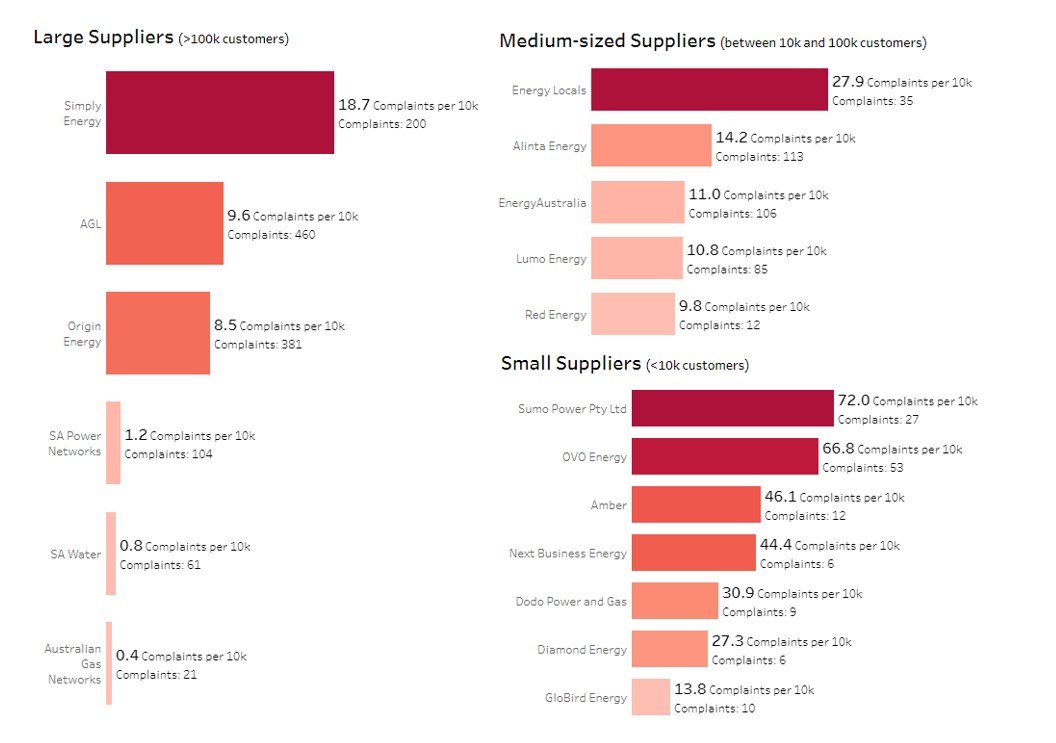
The number of complaints per 10,000 customers for each supplier is calculated by dividing the number of complaints received during the quarter by the total number of customers for each supplier, multiplied by 10,000. Large Suppliers are those with over 100,000 customers, Medium-sized Suppliers have between 10,000 and 100,000 customers, Small Suppliers have between 1,000 and 10,000 customers and Very Small Suppliers have less than 1,000 customers. The total number of complaints is also presented for context.
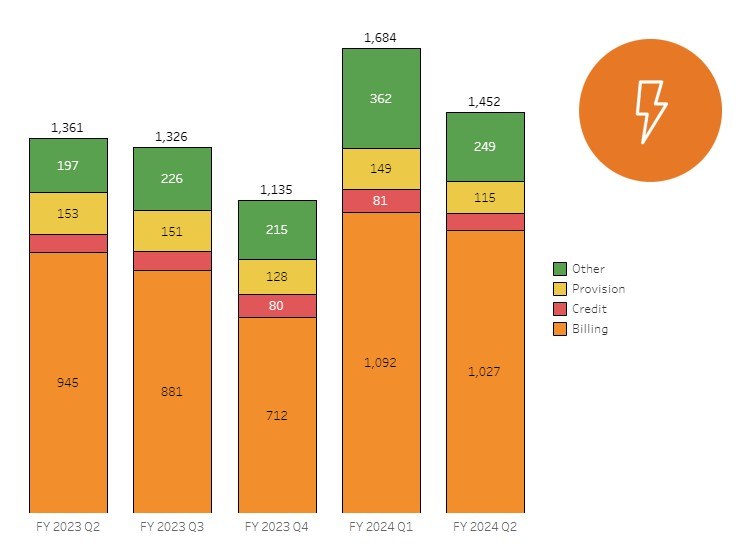
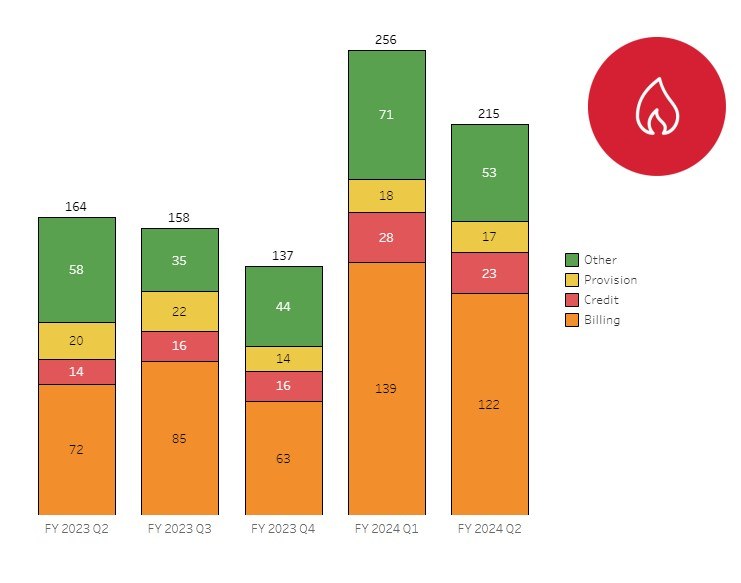
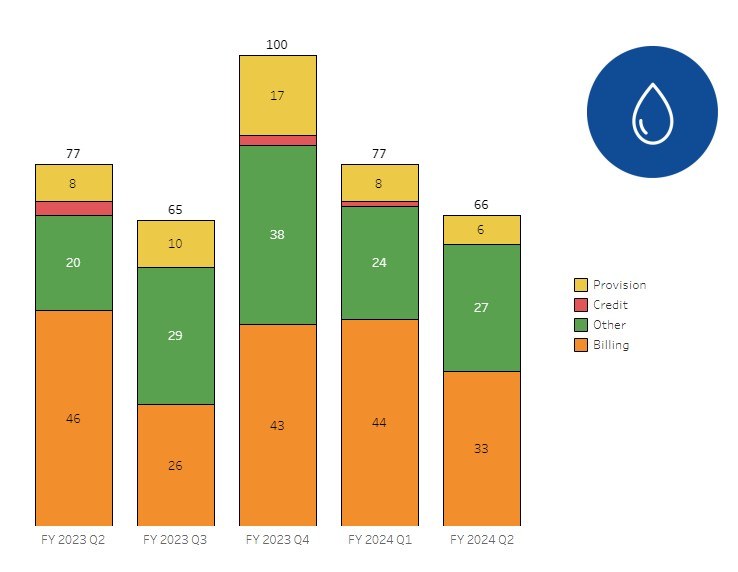
Remember, we are here to help
EWOSA facilitates the prompt resolution of complaints and disputes between consumers of electricity, gas and water services and Members of the Scheme by providing a service to consumers which is free, independent, accessible, fair and informal.
Freecall 1800 665 565
SMS 0488 854 555